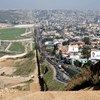waters
Stefanie Walters: CANCELLED
Professor, Department of Political Science, University of Zürich.More information will be announced. No registration is needed. Welcome to the Institute for Futures Studies, Holländargatan 13 in Stockh
Implementing the Water Framework Directive and Tackling Diffuse Pollution from Agriculture: Lessons from England and Scotland
in: Water 12: 244 AbstractTackling diffuse pollution from agriculture is a key challenge for governments seeking to implement the European Union’s Water Framework Directive (WFD). In the research liter
Modeling bacterial attenuation in onsite waste-water treatment systems using the active region model and column-scale data
Environmental Earth Sciences 74(6), pp. 4827-4837, doi: 10.1007/s12665-01 Abstract Bacterial attenuation in porous media is often higher in columns than in the field. This study investigates whether this
Legitimacy at sea. Authority and extraterritorial border controls
Critical Review of International Social and Political Philosophy Abstract This paper examines the legitimacy of extraterritorial border controls, specifically maritime interceptions, through the lens of

The territory of democracy
The presumption that the jurisdiction of the state extends to the borderes of a certain territory is increasingly being challenged, both by indigenous people within this territory, and by extraterritoriral border control.
Applying spatial regression to evaluate risk factors for microbiological contamination of urban groundwater sources in Juba, South Sudan
Hydrogeology Journal 25(4) pp. 1077-1091, doi: 10.1007/s10040-016-1504-x Abstract This study developed methodology for statistically assessing groundwater contamination mechanisms. It focused on microbiahumanitarian aid organisation Médecins Sans Frontières in 2010. The factors included hydrogeological settings, land use and socio-economic characteristics. The results showed that the residuals of a conventional probit regression model had a significant positive spatial autocorrelation (Moran’s I =3.05, I-stat = 9.28); therefore, a spatial model was developed that had better goodness-of-fit to the observations. The mostsignificant factor in this model (p-value 0.005) was the distance from a water source to the nearest Tukul area, an area with informal settlements that lack sanitation services. It is thus recommended that future remediation and monitoring efforts in the city be concentrated in such low-income regions. The spatial model differed from the conventional approach: in contrast with the latter case, lowland topography was not significant at the 5% level, as the p-value was 0.074 in the spatial model and 0.040 in the traditional model. This study showed that statistical risk-factor assessments of groundwater contamination need to consider spatial interactions when the water sources are located close to each other. Future studies might further investigate the cut-off distance that reflects spatial autocorrelation. Particularly, these results advise research on urban groundwater quality.
Environmentalism around the globe. An introduction to the 2020 ISSP environment module and selected country-level findings
International Journal of Sociology Abstract Environmental problems such as climate change, air and water pollution, and biodiversity loss affect humans globally. The International Social Survey Programm

Jason J. Czarnezki: Linking Environmental Law, Climate Justice and Global Security (webinarium)
Jason J. Czarnezki, Olof Palme visiting Professor, Gilbert and Sarah Kerlin Distinguished Professor of Environmental Law, Associate Dean of Environmental Law Programs and Strategic Initiatives, Elisab
Victor Galaz: AI and climate change – the Good, the Bad, the Ugly
Venue: Institute for Futures Studies,Holländargatan 13 in Stockholm or online Research seminar with Victor Galaz, Associate Professor in Political Science at the Stockholm Resilience Centre at Stockholm

Victor Galaz: AI and Climate Change – the Good, the Bad, the Ugly
Artificial intelligence (AI) is often discussed as a potential “game changer” for climate change action. One key issue in this conversation focuses on the growing energy, water and carbon footprint of








